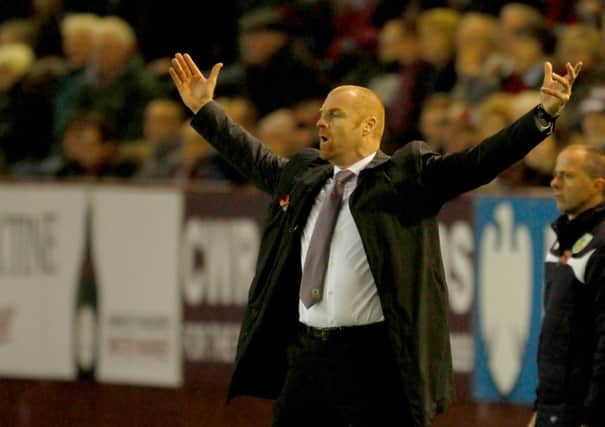Elitist thinking is no guarantee of elite outcome, cautions Dyche


The FA blueprint, which was launched on Thursday, calls for joined-up thinking in international player development, from Under-15 level upwards, with youngsters encouraged to buy into “the England way” through initiatives such as digital wristbands for reference.
But Dyche is already sceptical about some of the comforts and amenities available to school-age children at Premier League academies and believes it is important not to wrap the stars of the future in cotton wool from the start.
“It’s diluting to get this elitism,” said Dyche.
Advertisement
Hide AdAdvertisement
Hide Ad“We know they’re going to get enhanced coaching and better facilities at almost every level but you can’t get so drunk on that that you forget about the passion, pride, belief, desire and will.
“It’s fair to say this elitist thought doesn’t guarantee an elite outcome. In fact it can take it away.
“When you get these elitist groups sometimes the rawness of a player is lost and I think they’ve got to understand that.
“It’s not just the technical, tactical, physical...there still needs to be that rawness and some of the best have got it.
Advertisement
Hide AdAdvertisement
Hide Ad“They get treated unbelievably well. Sometimes, farcically well.
“You get a 14-year-old needing a rub down before training. I can’t accept that.
“I spoke to an eight-year-old who told me he had done his hamstring. I said, ‘I can’t believe you know what your hamstring is, son. Now go out there and get running’.
“People might say it’s an archaic view but I think the moral fibre of footballers is as relevant now as its ever been.”
Advertisement
Hide AdAdvertisement
Hide AdThe proposals received more enthusiastic reactions from Arsenal boss Arsene Wenger and Everton counterpart Roberto Martinez.
Wenger, who is viewed as a pioneering figure in English football for the revolutions in diet and sports science he brought to the Gunners in 1996, welcomed the FA’s continuing endeavours to improve the system from the bottom up.
“I think the federation has responded well, by restructuring the academies and by developing grass-roots football,” he said.
“I think good technique is the most important. The most important is to get good education to people who start to play at the age of seven years old.
Advertisement
Hide AdAdvertisement
Hide Ad“What is very important for English football is to target exactly what kind of qualities we want to develop and at what age, that is the most important.”
Wenger does not see an inherent problem in the mentality of domestic players, but does believe the senior national side presents a highly-pressured environment.
“I think the attitude of the players in England is good – they love their country, they want to do well for their country,” he said.
“They are under a lot of pressure when they play for the national team, but they all want to do well.”
Advertisement
Hide AdAdvertisement
Hide AdMartinez learned his football in his native Spain before moving to England, and believes the appetite for change is proof that things are moving in the right direction.
“I think it is very positive,” he said. “The best teacher of the game is the game itself. You need to allow a young player to have many touches on the ball in small-sided games, where they can find a way to score goals, which is the biggest tool.
“That will help a player become instinctive and a thinker. But it is important as well to have a bit of a path, because football is a team sport and you need to suit your quality as an individual into the team. So clearly, all this work will benefit.
“First of all it starts a really good debate, and you can agree or disagree with the aspects of the programme and the direction. But it has been seen in many countries – Belgium, Holland, Spain, these long-term programmes really, really help the countries find a way of playing and a way of developing players.
Advertisement
Hide AdAdvertisement
Hide Ad“I think you shouldn’t be afraid of looking around (at other countries).
“Football is a world expression. Sometimes it can be an expression of your own culture and there is a choice of style. I think English players and England as a nation has a uniqueness about what you can produce or the way you can play.
“But I don’t think there’s anything wrong with looking elsewhere and how people use their tactical awareness and technical aspects of the game.”
Hull City’s manager Steve Bruce hopes the latest raft of planning can help produce new stars to match the big names of his own playing days.
Advertisement
Hide AdAdvertisement
Hide AdBut he also cautioned that it would be fanciful to hope for a repeat of Manchester United’s famous ‘Class of ‘92’ in the current climate.
“I was fortunate enough to see six players come through at one of the biggest clubs in the world, and all come through together to play. I don’t think that will ever happen again,” he said.
“But something needed to be done because we have to start finding the new Paul Gascoigne or Bryan Robson.
“We have to start producing because we are spending a lot of money on academies, especially the top clubs.
“We’ve all spent millions and it’s fair to say we’ve not quite produced the players we’d like to.”